Speech and debate team championships represent the culmination of countless hours of research, preparation, practice, and competitive excellence—honoring students whose mastery of argumentation, public speaking, interpretation, and critical thinking places them among the nation’s finest young communicators and thinkers. Success at district, state, and national championship levels requires exceptional dedication, intellectual rigor, and performance skills that distinguish elite competitors from accomplished participants.
Yet many schools struggle to provide recognition that matches the significance of speech and debate championship achievements. Traditional approaches—brief assembly announcements that students forget within hours, paper certificates stored in folders rather than displayed, or outdated bulletin boards showing last year’s results—fail to create the lasting visibility and community awareness these remarkable accomplishments deserve. Meanwhile, athletic championships often receive prominent trophies, banners, and digital displays, inadvertently suggesting that physical competition matters more than intellectual excellence.
This comprehensive guide explores evidence-based strategies for implementing speech and debate recognition programs that celebrate championship achievements with appropriate prominence, inspire current students to pursue competitive forensics excellence, and create lasting tributes honoring elite performers who represent your school’s highest communication and critical thinking achievements.
Speech and debate championship recognition extends beyond individual acknowledgment—it creates systematic approaches that elevate forensics program visibility, demonstrate institutional commitment to communication excellence, and build cultures where competitive speaking and argumentation receive celebration equal to achievements in athletics and other extracurricular domains.
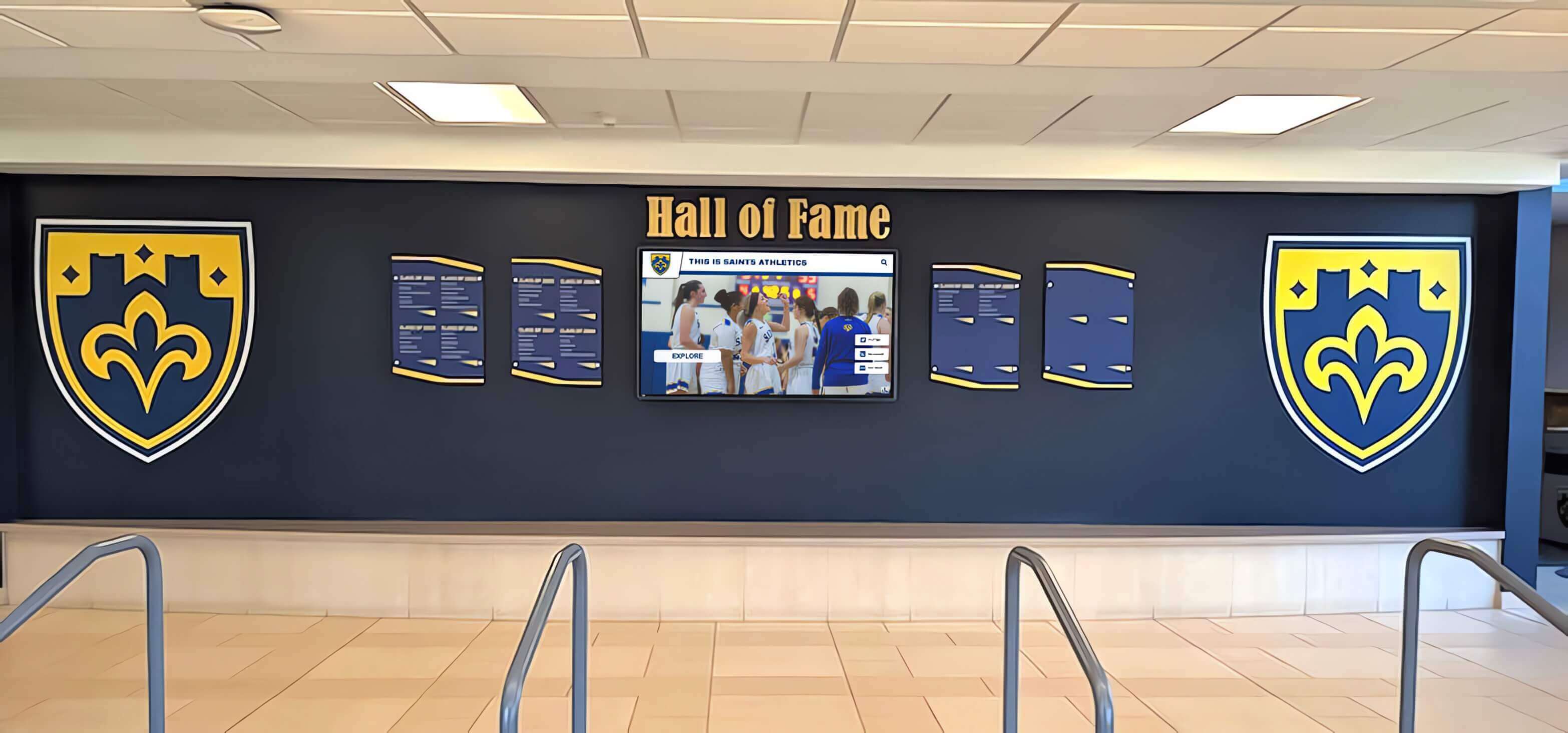
Modern recognition displays transform how schools celebrate speech and debate excellence and honor championship achievements
Understanding Speech and Debate Competition Structures
Before implementing recognition strategies, understanding what championship designation represents and how students earn these prestigious honors provides essential context for appropriate celebration.
The National Speech and Debate Association Framework
The National Speech & Debate Association (NSDA) serves as the primary governing body for high school forensics competition nationwide, establishing standardized event structures, qualification pathways, and championship formats.
Tournament Structure and Qualification Pathways
Students pursuing national recognition progress through competitive tiers culminating in the prestigious National Tournament held each June:
- Local and invitational tournaments: Regular season competitions building skills and earning qualification points
- District tournaments: Regional championships determining which students advance to national competition
- State championships: Prestigious state-level competitions honoring top performers within each state
- National tournament: Ultimate championship held annually, featuring qualified students from across the nation competing for national titles
According to the National Speech & Debate Association, the organization serves more than 140,000 students and coaches each year, providing competitive activities, resources, training, scholarship opportunities, and advanced recognition for students demonstrating excellence in speech and debate.
Speech and Debate Event Categories
Championship competition encompasses diverse event types requiring distinct skill sets and preparation approaches:
Debate Events
Debate formats emphasizing argumentation, research, and analytical thinking include:
- Policy Debate: Year-long topic with extensive research and strategic argumentation
- Lincoln-Douglas Debate: Value-oriented philosophical debate emphasizing ethics and moral reasoning
- Public Forum Debate: Accessible debate format addressing current events and public policy topics
- Congress: Legislative debate simulating governmental proceedings
Speech Events: Public Address
Original oratory and informative speaking events requiring:
- Original Oratory: Persuasive speeches on significant topics demonstrating rhetoric and delivery excellence
- Informative Speaking: Educational presentations conveying complex information accessibly
- Extemporaneous Speaking: Impromptu speeches on current events demonstrating quick thinking and communication
Speech Events: Interpretation
Performance-based events showcasing dramatic and interpretive skills:
- Dramatic Interpretation: Solo performance of dramatic literature
- Humorous Interpretation: Comedic performance emphasizing timing and character development
- Duo Interpretation: Two-person performance without physical contact
- Program Oral Interpretation: Thematic performance combining multiple literary selections
This event diversity means championship achievements span intellectual, rhetorical, and performance dimensions—requiring recognition approaches accommodating varied competitive excellence types.
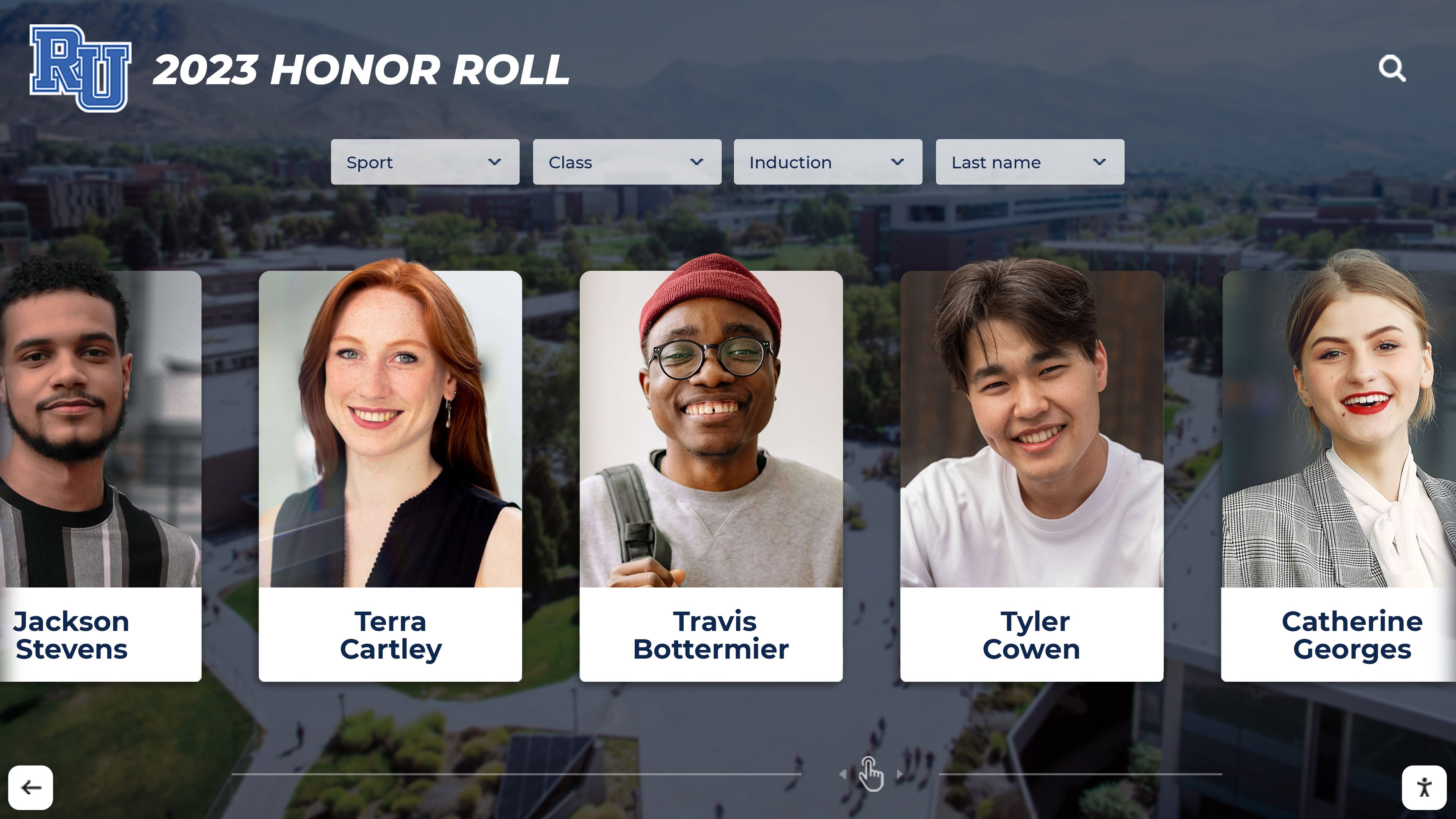
Comprehensive recognition systems document diverse achievement types across speech and debate event categories
State-Level Competition Organizations
Beyond NSDA, many states maintain independent forensics organizations conducting additional championship competitions. The California High School Speech Association (CHSSA), for example, has held championship tournaments every April since 1958, providing additional recognition pathways for student competitors.
Understanding these organizational structures helps schools contextualize recognition appropriately—distinguishing between district advancement, state championship success, and ultimate national qualification when celebrating student accomplishments.
Building Comprehensive Speech and Debate Recognition Programs
Effective recognition programs celebrate championship achievements through systematic approaches ensuring appropriate visibility, meaningful acknowledgment, and lasting preservation of extraordinary competitive success.
Immediate Recognition Following Championship Success
When students achieve championship recognition, immediate acknowledgment demonstrates institutional pride while capitalizing on community excitement surrounding these achievements.
School-Wide Announcement Strategies
Create comprehensive awareness through multiple announcement channels:
- Morning announcements providing detailed information about achievement significance and competitive context
- Social media posts celebrating championship winners with performance photos and achievement details
- School website feature stories highlighting competitive accomplishments and tournament journey
- Email communications to families explaining what championship recognition represents
- Community media outreach generating local press coverage extending recognition beyond school
- Newsletter features providing comprehensive achievement context
These multi-channel approaches ensure championship achievements receive visibility matching the exceptional nature of accomplishment while educating communities about competitive forensics excellence.
Forensics Department Recognition
Beyond school-wide acknowledgment, program-specific recognition creates meaningful celebration within the speech and debate community:
- Display updated championship lists prominently in debate classrooms and team meeting spaces
- Feature champions in forensics program newsletters and tournament documentation
- Create dedicated bulletin boards or recognition walls in designated spaces celebrating current and historical achievements
- Recognize champions during team meetings before peer competitors and coaches
- Update digital program platforms and websites with current championship honorees
This community-specific recognition provides acknowledgment from peers and mentors who fully appreciate the dedication and excellence championship success represents, as demonstrated by effective academic recognition programs that celebrate intellectual achievement systematically.
Formal Recognition Ceremonies and Celebrations
While immediate announcements provide timely acknowledgment, formal ceremonies create memorable recognition moments honoring championship achievements with appropriate significance.
End-of-Season Recognition Events
Forensics program award ceremonies provide ideal settings for comprehensive championship celebration:
- Honor district, state, and national qualifiers alongside other program awards and recognitions
- Allow coaches to speak specifically about each competitor’s journey and achievement
- Present certificates, plaques, or commemorative items reflecting accomplishment significance
- Invite families to attend celebration moments honoring their students
- Create formal atmosphere communicating institutional pride in competitive excellence
- Feature video highlights or performance excerpts showcasing championship moments
Awards ceremonies provide focused recognition time allowing appropriate acknowledgment detail impossible during regular school assemblies or daily announcements.
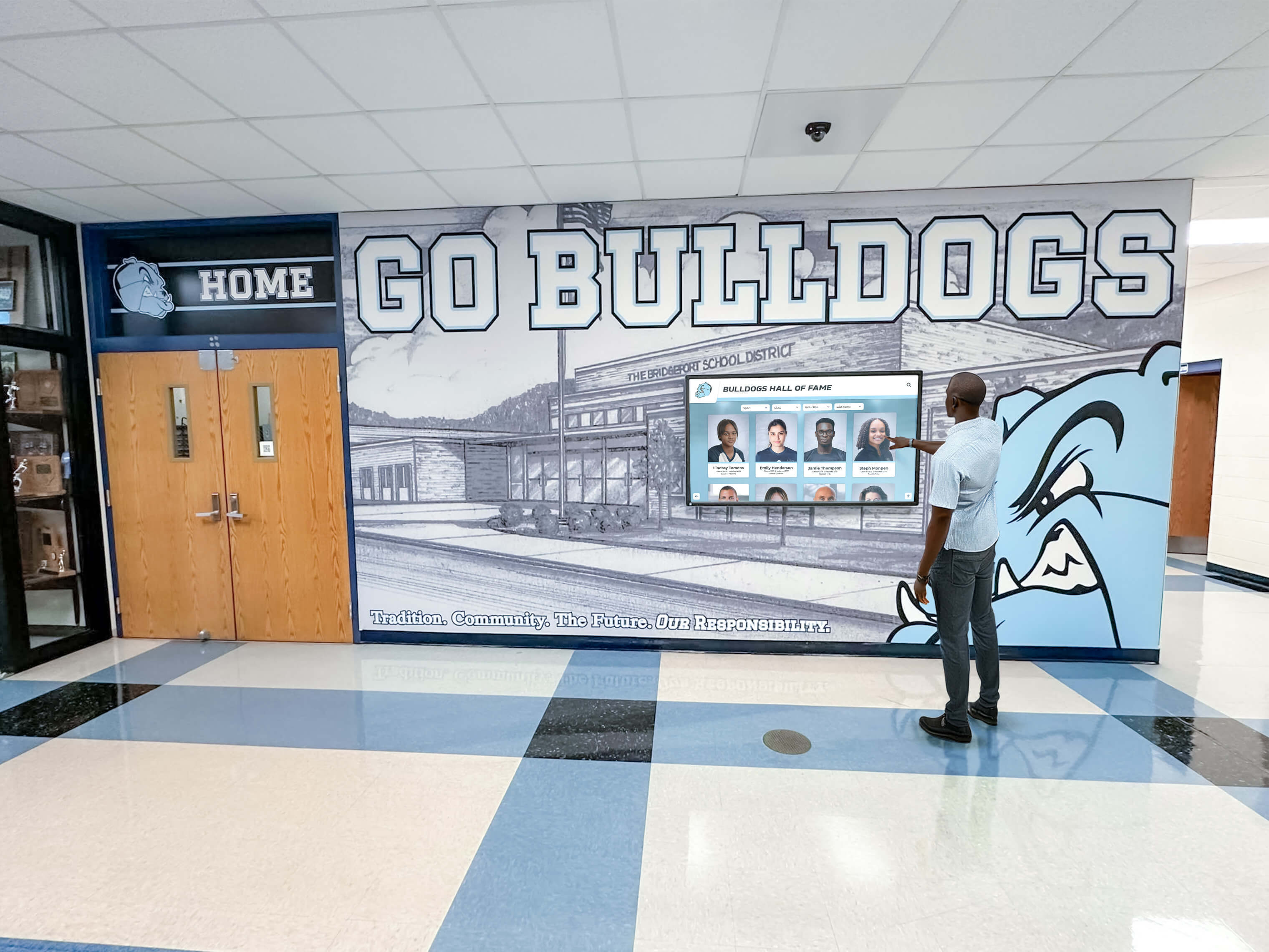
Interactive displays enable detailed exploration of competitive achievements and championship journeys
School-Wide Academic Excellence Recognition
Beyond forensics-specific celebrations, school-wide recognition demonstrates that competitive communication achievement matters institution-wide:
- Feature speech and debate champions during academic excellence assemblies alongside scholarly achievements
- Include championship recognition in annual awards ceremonies celebrating school-wide accomplishments
- Invite champions to perform or demonstrate competitive pieces for school assemblies
- Feature championship achievements in principal communications and administrative recognition of student excellence
- Include forensics achievement recognition in events celebrating comprehensive student success
This broad recognition signals that schools value communication and critical thinking excellence equally alongside athletic and traditional academic achievement, addressing historic imbalances. Resources about student achievement recognition demonstrate how schools create equitable recognition across all achievement domains.
Historical Context and Legacy Building
Championship recognition should connect current achievements to program tradition and historical excellence:
Multi-Year Achievement Tracking
Document competitive success across program history:
- Maintain comprehensive records of district, state, and national qualifiers throughout decades
- Track event-specific championships and recognition across multiple competition formats
- Preserve information about legendary competitors and historic tournament performances
- Connect current students with alumni who achieved similar excellence
- Document program evolution and competitive development over time
This historical perspective demonstrates sustained program excellence while providing inspirational context showing current students join distinguished tradition of competitive achievement.
Digital Recognition Solutions for Speech and Debate Programs
Modern technology enables schools to create comprehensive, lasting championship recognition overcoming limitations of traditional approaches constrained by physical space and manual update requirements.
Advantages of Digital Forensics Recognition Displays
Digital recognition platforms transform championship acknowledgment from temporary bulletin boards to permanent, engaging tributes honoring competitive excellence comprehensively.
Unlimited Recognition Capacity
Digital systems eliminate space constraints forcing difficult decisions about which achievements receive limited display opportunities:
- Showcase every championship qualifier throughout program history without capacity limitations
- Include comprehensive achievement details impossible with physical plaque constraints
- Preserve complete historical records demonstrating sustained program excellence
- Accommodate future champions indefinitely without display case expansion
- Document achievements across all event categories without prioritizing certain competitions
This unlimited capacity ensures every championship achievement receives appropriate permanent recognition rather than disappearing to accommodate newer honorees.
Rich Multimedia Content Integration
Unlike static plaques limited to names and years, digital recognition incorporates engaging content bringing achievements to life:
- Multiple photographs capturing competition moments, award ceremonies, and team activities
- Video content featuring championship performances, tournament highlights, or student reflections
- Audio recordings preserving actual speeches or debate rounds demonstrating competitive excellence
- Detailed achievement narratives explaining qualification journey and accomplishment significance
- Complete biographical information including events competed, coaches, future plans, and competitive background
- Tournament results and performance statistics documenting competitive success
This multimedia richness creates engaging recognition experiences that inspire current students while comprehensively honoring achievement.
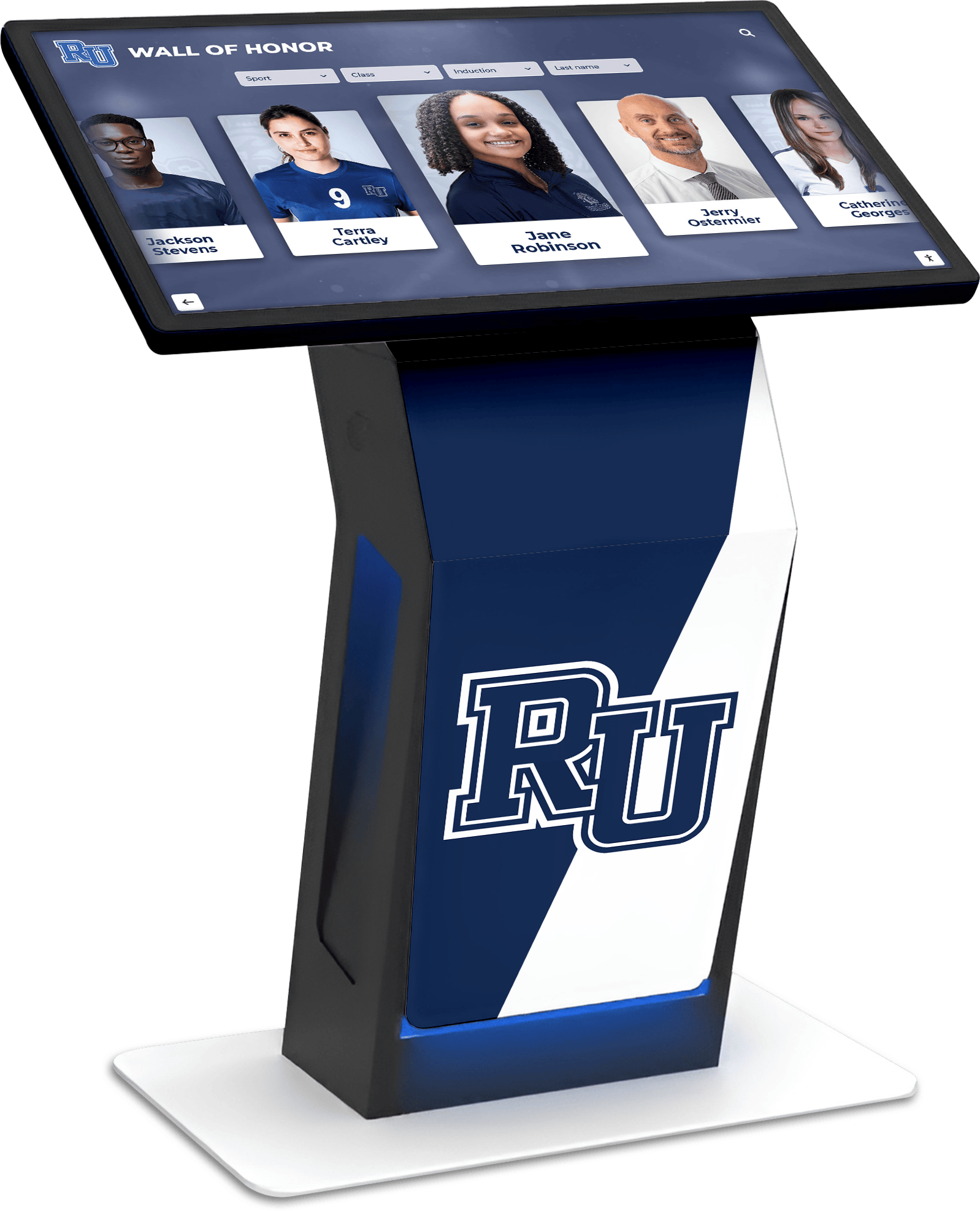
Purpose-built recognition systems combine hardware and software designed specifically for educational institutions
Interactive Exploration Features
Digital platforms enable active engagement replacing passive viewing of static displays:
- Search functionality allowing students to find specific competitors, years, or events
- Filtering capabilities organizing achievements by decade, event type, or championship level
- Related content connections showing teammates, classmates, or competitors from particular eras
- Detailed profile pages providing comprehensive achievement stories beyond basic information
- Historical timeline views demonstrating program development across decades
- Event-specific achievement tracking showing evolution of competitive success
Interactive features particularly resonate with contemporary students expecting touchscreen interfaces and explorable content in educational technology, similar to approaches used in outstanding student recognition programs.
Immediate Content Updates
Add newly crowned champions to recognition displays instantly rather than waiting for physical plaque production:
- Update displays immediately following tournament results and qualification announcements
- Maintain current recognition without lag time between achievement and acknowledgment
- Modify or enhance content easily as additional information becomes available
- Correct errors or update details without costly plaque replacement
- Refresh historical content when additional photos or information surface
This update flexibility ensures recognition remains current while preserving ability to enhance historical content continuously.
Solutions like Rocket Alumni Solutions provide purpose-built platforms specifically designed for educational recognition, combining intuitive content management, reliable hardware, professional support, and features addressing unique needs of forensics programs celebrating student achievement.
Essential Content for Championship Competitor Profiles
Comprehensive digital recognition should include carefully curated content honoring achievement while providing inspiration and context for current students.
Core Achievement Information
Every championship competitor profile should document:
- Full name and graduation year for identification and historical context
- Events competed specifying speech or debate categories
- Championship levels achieved (district qualifier, state champion, national competitor)
- Tournament years recognizing multi-year competitive achievement
- Final placements or recognition levels at championship competitions
- Qualification pathway showing progression through competitive tiers
- Team partnerships for duo interpretation or debate formats
This foundational information provides complete achievement record while contextualizing accomplishment within competitive structure.
Competitive Journey and Background
Beyond basic achievement data, meaningful recognition includes narrative content:
- Years in forensics program showing sustained commitment and development
- Coaches and mentors contributing to competitive success
- Previous achievements building toward championship recognition
- Memorable performances or tournament successes throughout competitive career
- Challenges overcome demonstrating perseverance alongside talent
- Practice dedication and preparation approaches used for competitive success
- Academic interests and connections between forensics and broader intellectual pursuits
These narratives transform simple achievement lists into inspiring stories demonstrating that championship success results from sustained dedication rather than effortless natural talent.

Integrated recognition systems combine digital displays with traditional school branding creating comprehensive celebration spaces
Visual and Multimedia Content
Rich media brings competitive achievements to life:
- Competition photographs capturing students in action during tournaments, award ceremonies, or team events
- Formal portrait photos providing clean identification imagery
- Performance documentation showing students competing in their events
- Video footage of championship performances or tournament moments
- Audio recordings of memorable speeches or debate rounds when available
- Award ceremony documentation showing recognition moments
Post-High School Impact and Pathways
When available, include information about competitors’ continued involvement:
- College debate team participation or competitive continuation
- Communication and rhetoric program enrollment
- Scholarship achievements and college admissions successes
- Career paths emphasizing communication, law, politics, or public policy
- Ongoing speaking, advocacy, or communication engagement
- Professional accomplishments leveraging forensics skills
This future-focused content demonstrates lasting impact of strong forensics programs while showing current students potential pathways following graduation, similar to approaches documented in alumni recognition programs.
Strategic Display Placement for Maximum Visibility
Physical display location significantly impacts recognition program visibility and community awareness of forensics program excellence.
High-Traffic School Locations
Position championship recognition displays where entire school communities encounter them regularly:
- Main entrance lobbies welcoming all visitors and creating immediate impressions
- Library and media center spaces supporting extended viewing during study time
- Main hallway intersections with natural gathering points and high daily traffic
- Cafeteria areas where students spend time and can actively explore content
- Academic building locations emphasizing intellectual achievement
These locations ensure recognition reaches beyond forensics students to entire school populations, elevating awareness of competitive communication achievement school-wide.
Forensics-Specific Spaces
Dedicated recognition in specialized spaces provides focused celebration within the speech and debate community:
- Debate classrooms and practice spaces where students spend daily time
- Forensics team meeting rooms and common areas serving all program participants
- Coach office areas where students, parents, and teams gather
- Competition preparation spaces reminding students of championship standards
- Tournament viewing areas where students watch rounds and prepare for competition
Program-specific placement creates continuous inspiration for students actively pursuing competitive excellence while demonstrating tradition and achievement standards.
Web-Based Recognition Extensions
Digital recognition platforms should extend beyond physical displays through online access:
- School website integration making champions accessible to broader communities
- Mobile-responsive designs enabling smartphone and tablet viewing
- Social sharing capabilities allowing students and families to celebrate achievements
- Alumni access permitting graduates to explore current program successes
- Community visibility demonstrating forensics program quality to prospective families
Web accessibility proves particularly valuable for extended family, alumni, and community members unable to visit campus regularly but interested in program achievements, as shown in comprehensive digital recognition approaches.
Integrating Championship Recognition Into Forensics Program Culture
Recognition achieves maximum impact when integrated systematically into program culture rather than existing as isolated display or occasional announcement.
Creating Championship Achievement Traditions
Establishing consistent traditions around championship recognition builds anticipation while emphasizing achievement significance year after year.
Pre-Tournament Send-Off Celebrations
Before students depart for championship tournaments, celebrate their qualification:
- Host special team meetings or gatherings featuring tournament qualifiers
- Present travel gifts or team apparel creating tangible connection
- Gather families and program supporters for pre-tournament celebrations
- Share qualification journey stories and preparation approaches
- Create group photos documenting each year’s championship participants
- Provide encouragement and acknowledge honor of representing school at championship level
Send-off events build community support while acknowledging the honor of championship qualification and competition.
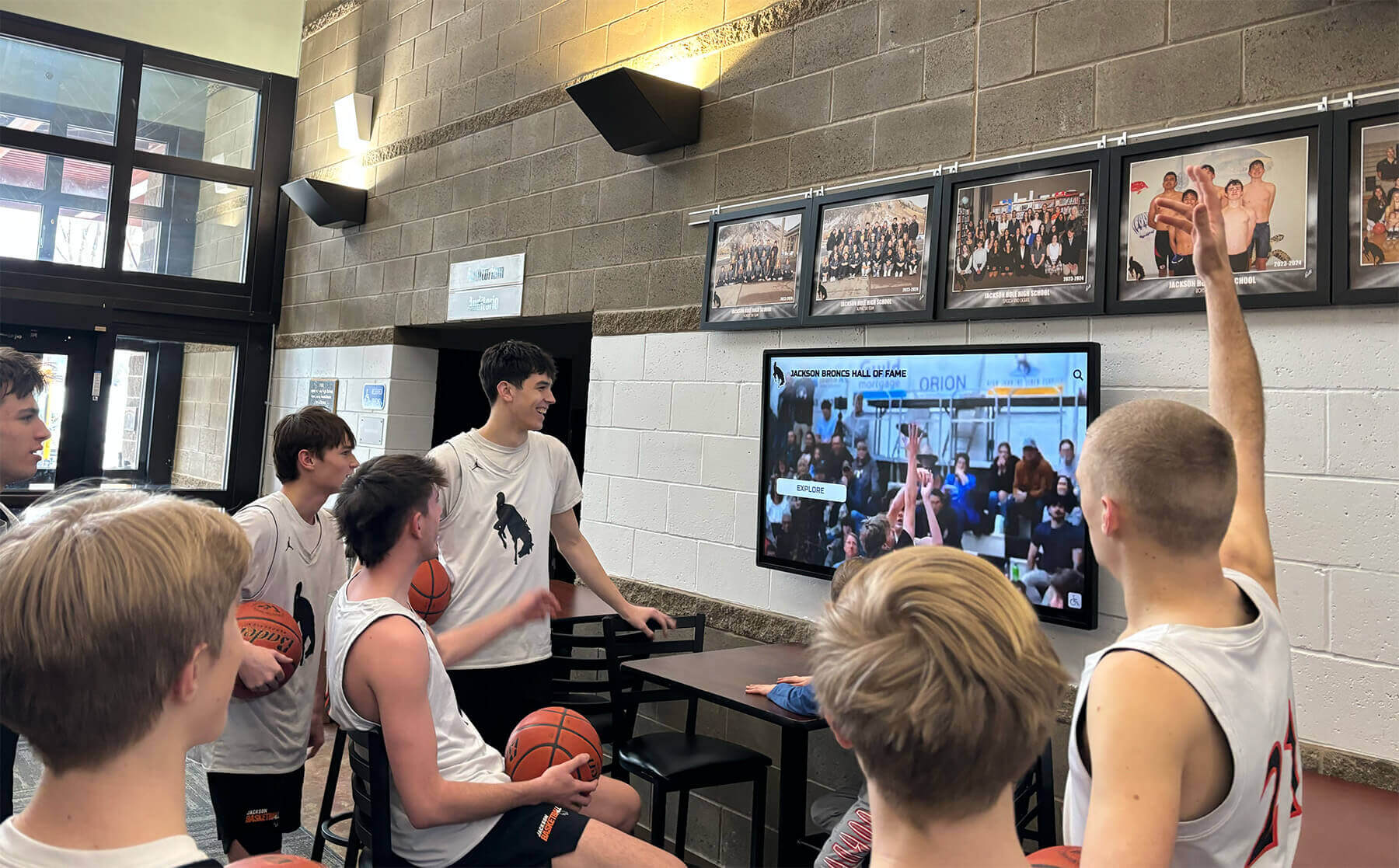
Strategic placement encourages student engagement with achievement displays and competitive excellence documentation
Tournament Return Recognition Celebrations
Upon return from championships, celebrate competitive experiences and achievements:
- Provide opportunities for competitors to share experiences with team members and classes
- Display tournament programs, awards, and performance documentation
- Share results and achievement details through multiple channels
- Recognize growth and learning from elite competition experiences
- Celebrate both competitive success and valuable tournament participation
- Feature championship performances or rounds in team meetings when possible
Return celebrations extend recognition beyond initial qualification to honor complete championship experience and competitive journey.
Mentorship Programs Connecting Champions
Create ongoing connections between current and former championship competitors:
- Establish peer mentoring where previous champions advise current competitors
- Invite championship alumni to visit and share experiences with current students
- Create networking opportunities connecting current students with forensics alumni
- Develop online communities enabling champions to stay connected
- Organize panel discussions where multiple championship alumni discuss their journeys
- Document mentorship relationships as part of recognition program
These mentorship traditions demonstrate that championship achievement creates lasting bonds while providing practical guidance for students pursuing similar goals, following patterns seen in effective student mentorship programs.
Educational Components of Championship Recognition
Effective recognition programs educate students and broader communities about what championship achievement represents and how students can pursue competitive excellence.
Competition Process Education
Help students understand championship qualification requirements and expectations:
- Explain tournament structure from local through district, state, and national levels
- Share event requirements and performance expectations for different categories
- Discuss preparation approaches and practice commitments for championship success
- Address competition anxiety and performance preparation strategies
- Provide statistical context about selection competitiveness and advancement rates
- Document successful preparation strategies used by previous champions
This education demystifies championship pathways while helping serious students understand concrete steps toward earning recognition.
Achievement Journey Documentation
Share complete stories of champions’ paths to competitive excellence:
- Document practice hours and preparation dedication required for success
- Highlight influential coaches and mentorship relationships that contributed to achievement
- Acknowledge obstacles overcome and setbacks navigated during competitive journey
- Discuss balance between forensics pursuits and academic commitments
- Share what students would do differently knowing what they learned
- Connect competitive success to broader communication skill development
These authentic narratives provide roadmaps more valuable than simple announcement of achievement, demonstrating that excellence results from sustained effort rather than unexplainable talent.
College Recruiting and Scholarship Connections
Educate students and families about how championship recognition impacts future opportunities:
- Explain how college admissions offices view championship forensics achievement
- Discuss scholarship opportunities connected to competitive speech and debate
- Share alumni experiences with college applications following championship success
- Address realistic expectations about collegiate debate and communication careers
- Connect championship achievement to broader college admissions advantages
- Feature successful alumni who leveraged forensics achievement academically and professionally
This practical information motivates serious competitors while helping families understand value extending beyond immediate recognition, similar to approaches used in academic recognition programs that connect achievement to future success.
Measuring Championship Recognition Program Impact
Assessment demonstrates recognition program value while identifying opportunities for enhancement and improved effectiveness.
Quantitative Impact Indicators
Track specific metrics revealing recognition program influence on forensics program culture and student motivation.
Participation and Achievement Metrics
Monitor trends suggesting recognition program effectiveness:
- Number of students participating in competitive speech and debate
- Tournament attendance rates and competitive engagement levels
- Advancement rates from local to district to state to national levels
- Total championship qualifiers annually compared to historical averages
- Multi-year competitors demonstrating sustained commitment
- Distribution of success across event categories and competition formats
Growing participation and success rates suggest that recognition programs effectively motivate students to pursue competitive forensics excellence.
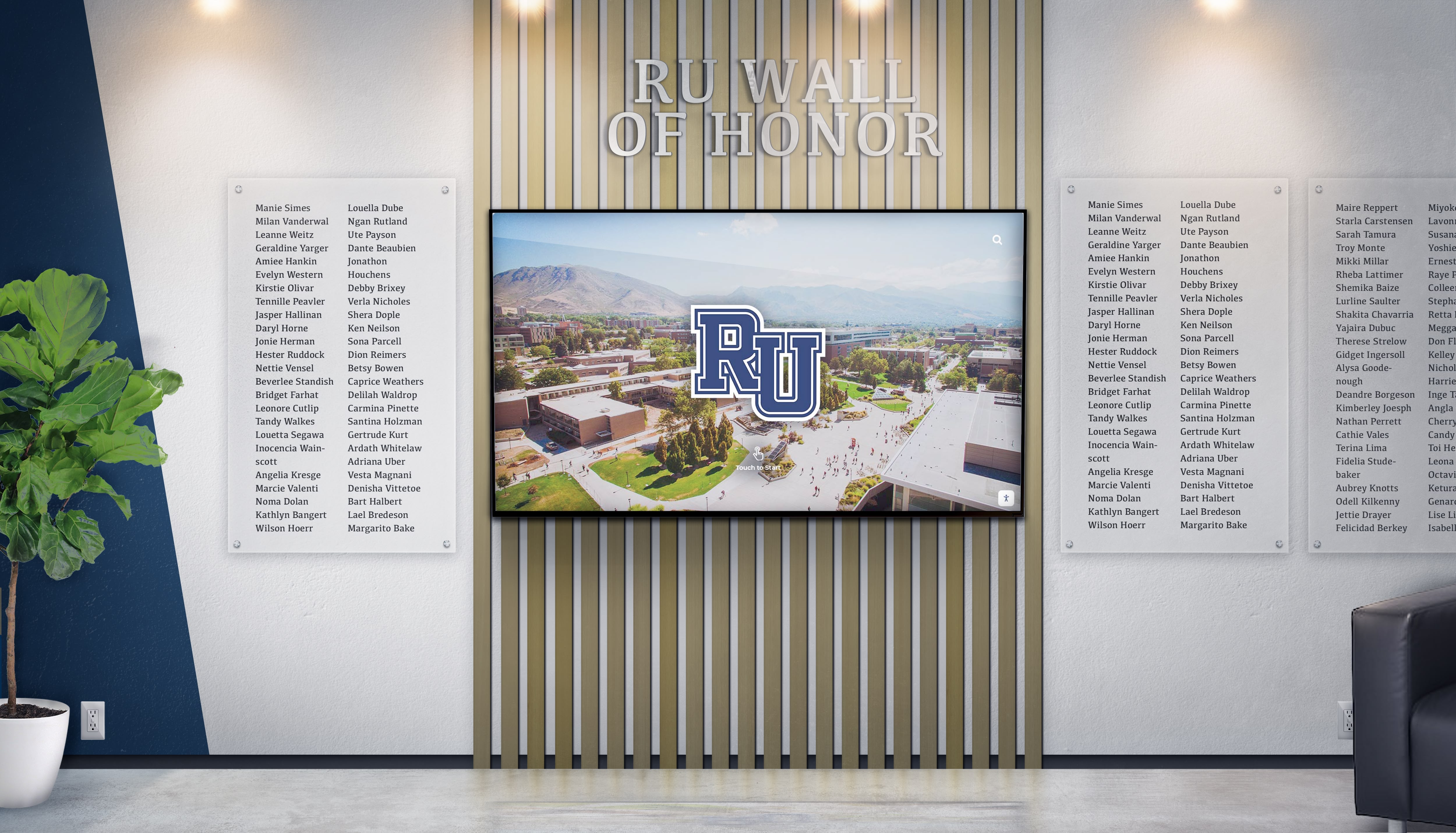
Recognition systems preserve program history while celebrating current achievements and championship success
Student Engagement Indicators
For digital recognition systems, analytics reveal community engagement:
- Display interaction frequency showing how often students explore content
- Session duration indicating depth of engagement with recognition content
- Most-viewed profiles revealing which competitors or stories resonate most
- Search patterns demonstrating how students explore historical achievements
- Return visitors suggesting sustained interest beyond one-time curiosity
These engagement metrics validate display placement and content strategies while identifying particularly effective recognition approaches worth expanding.
Program Health and Growth
Assess broader program indicators potentially influenced by recognition culture:
- Year-over-year enrollment in forensics programs and competitive teams
- Student retention rates from novice through advanced competition levels
- Participation in optional tournaments and competitive opportunities
- Private coaching or summer program enrollment among serious competitors
- Communication-related major and minor declarations among graduating students
While multiple factors influence these indicators, strong recognition cultures contribute to thriving programs where students pursue competitive excellence throughout secondary education.
Qualitative Feedback Collection
Numbers provide important measures, but qualitative feedback offers deeper understanding of how recognition influences student experiences and program culture.
Student Competitor Perspectives
Gather feedback from both championship achievers and students pursuing that success:
- Survey champions about recognition meaningfulness and satisfaction
- Ask aspiring competitors whether recognition programs influence their motivation
- Explore whether students understand pathways to championship achievement
- Assess student awareness of historical program success and tradition
- Collect suggestions for recognition program enhancement from student perspective
Direct student feedback reveals whether recognition resonates with primary audiences while identifying improvement opportunities from competitor perspectives.
Coaching Staff Input
Forensics coaches and mentors observe recognition impact firsthand:
- Request coach perspectives about recognition program influence on student motivation
- Gather observations about program culture shifts following recognition implementation
- Solicit feedback about recognition program manageability and sustainability
- Discuss whether recognition helps recruitment and retention of serious competitors
- Identify enhancement opportunities coaches observe through daily student interaction
Coach insights prove particularly valuable since forensics staff witness long-term student development and cultural evolution following recognition program implementation.
Family and Alumni Satisfaction
Parents and graduates provide external perspectives on recognition effectiveness:
- Survey families about satisfaction with recognition their students received
- Ask alumni whether recognition influenced their competitive development and continued involvement
- Explore whether alumni maintain connections to programs partly through recognition visibility
- Assess family perceptions about program quality and institutional support
- Gather suggestions from multiple stakeholder groups about recognition enhancement
This broad stakeholder feedback ensures recognition programs serve diverse audiences while maintaining primary focus on inspiring and honoring student competitors, as seen in comprehensive student recognition approaches.
Addressing Common Speech and Debate Recognition Challenges
Schools implementing comprehensive forensics recognition often encounter specific obstacles requiring thoughtful solutions ensuring program sustainability and effectiveness.
Challenge: Balancing Individual and Team Recognition
Championship honors often recognize individual competitors, yet forensics excellence develops through team participation, peer practice, and collaborative program culture.
Solution Strategies:
Balance individual championship recognition with appropriate acknowledgment of team context:
- Feature team photos alongside individual champion profiles
- Acknowledge coaches and practice partners contributing to championship success
- Include information about program participation supporting competitive development
- Recognize complete program traditions enabling individual championship achievement
- Celebrate peer competitors who support and inspire championship achievers
- Document team culture and collaborative practice approaches
This contextual recognition honors individual achievement while acknowledging collaborative environment essential for developing championship-level competitors.
Challenge: Equity Across Event Categories
Schools may consistently produce champions in certain event categories—perhaps strong debate program with limited speech success, or interpretation tradition with newer policy debate team—creating recognition imbalances.
Solution Strategies:
Ensure equivalent recognition regardless of event category success rates:
- Provide equal display prominence and content quality across all competitive events
- Celebrate growth and development even when absolute championship numbers vary between categories
- Recognize district and state advancement demonstrating achievement even when national qualification remains challenging
- Feature competitive excellence comprehensively beyond just championship designation
- Acknowledge program-building efforts and improvement trajectories alongside ultimate successes
- Document competitive success across all event types without prioritizing certain formats
This balanced approach maintains high standards while recognizing that program maturity, coach expertise, and competitive landscapes vary across forensics event categories.
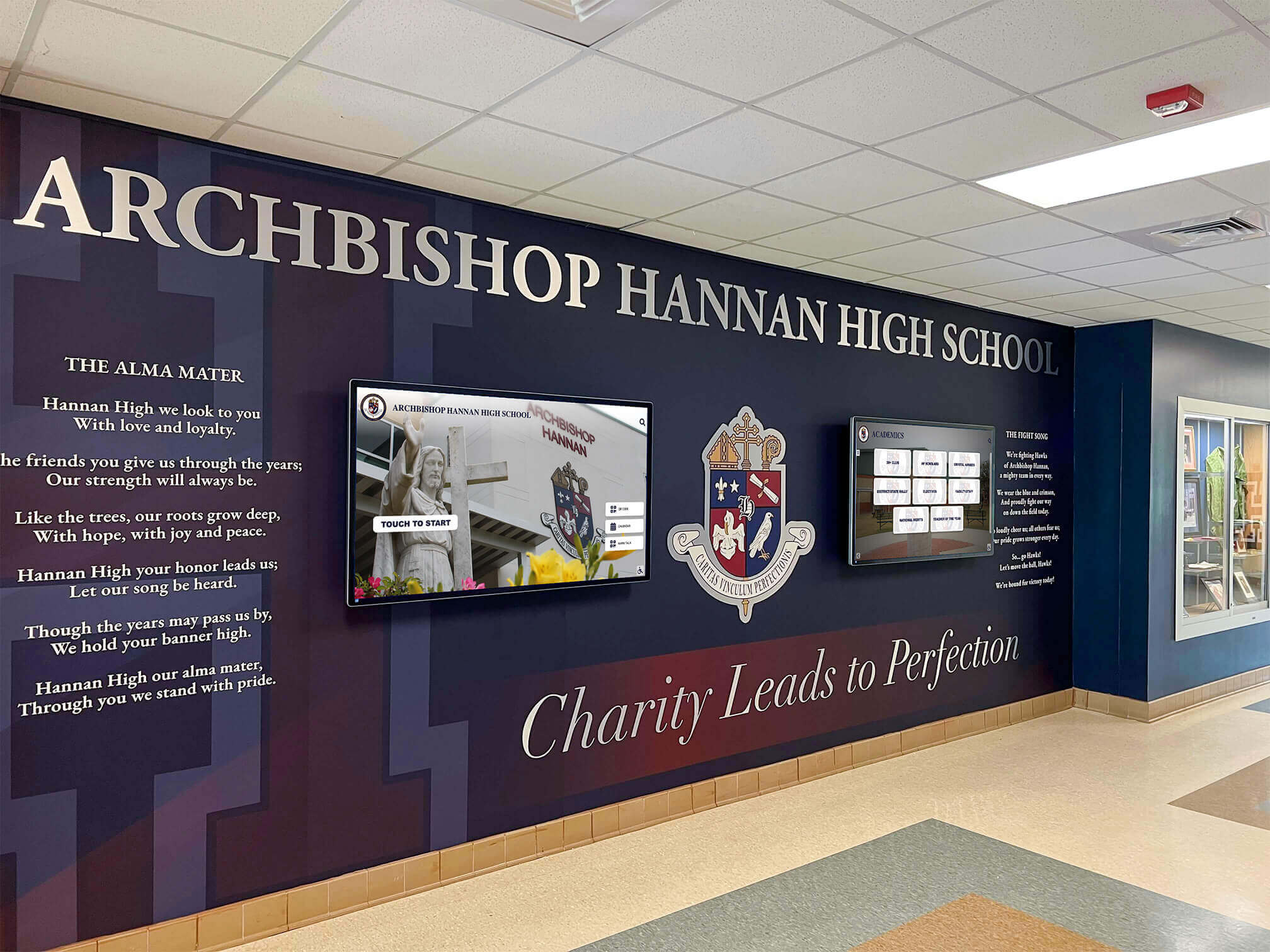
Prominent recognition placement in high-traffic areas ensures championship achievements receive appropriate visibility
Challenge: Maintaining Historical Recognition Currency
As decades of championship qualifiers accumulate, schools struggle to keep historical information current, accurate, and complete.
Solution Strategies:
Systematic approaches preserve historical achievement records while managing updates sustainably:
- Establish alumni outreach requesting historical photos and information
- Create student projects researching and documenting forensics program history
- Develop crowdsourced contribution systems enabling community members to submit content
- Partner with local historical societies or school archives preserving documentation
- Implement phased historical content development tackling recent decades first before working backward
- Document tournament results and qualification information systematically each year
Digital platforms make historical preservation practical through unlimited capacity and easy content addition as information becomes available, as demonstrated in school history preservation approaches.
Challenge: Budget Constraints and Funding Recognition Programs
Comprehensive digital recognition requires investment that forensics programs with limited funding may struggle to afford.
Solution Strategies:
Creative funding approaches make quality recognition achievable within budget constraints:
- Seek forensics booster organization support through dedicated fundraising
- Pursue local business sponsorships from communication-focused community partners
- Apply for speech and communication education grants supporting recognition and celebration
- Explore memorial gift opportunities honoring beloved coaches or former competitors
- Implement phased development spreading investment across multiple budget cycles
- Partner with school foundation or alumni association for recognition funding
- Connect recognition investment to recruitment and program growth objectives
Many schools find that successful pilot recognition implementations generate enthusiasm making subsequent funding requests easier to approve as stakeholders witness impact and value.
Solutions like Rocket Alumni Solutions offer flexible implementation options accommodating varied budgets while providing comprehensive recognition capabilities schools need to honor championship competitors appropriately.
Best Practices for Sustainable Championship Recognition Programs
Long-term recognition program success requires sustainable management approaches ensuring quality recognition continues across staff transitions and evolving circumstances.
Designate Clear Responsibilities and Workflow
Assign specific staff responsibility for recognition program coordination:
- Designate head coach or forensics director as recognition lead
- Provide dedicated time allocation acknowledging coordination requires ongoing attention
- Establish backup coordinators preventing disruption during absences or transitions
- Create documented procedures enabling new coordinators to maintain programs
- Schedule regular recognition system training for new forensics staff
- Build recognition responsibilities into formal job descriptions
Clear responsibility assignment with appropriate support ensures recognition programs remain consistent priorities rather than volunteer efforts easily abandoned when circumstances change.
Develop Standardized Content Templates
Consistency in recognition profile structure ensures quality across all honorees:
- Create content templates specifying required information for each championship competitor
- Establish photo specifications ensuring consistent visual quality
- Develop style guides maintaining uniform writing voice and formatting
- Provide content examples demonstrating target quality and detail level
- Build content approval workflows when necessary ensuring review before publication
- Document tournament result tracking procedures for consistent achievement recording
Templates streamline content creation while maintaining professional standards protecting recognition program credibility and impact.
Establish Regular Update Schedules
Systematic update calendars prevent recognition from becoming outdated:
- Schedule championship qualifier additions immediately following tournament results
- Plan annual reviews verifying all current-year achievements appear
- Conduct periodic historical audits identifying gaps in legacy content
- Calendar seasonal recognition campaign refreshes highlighting different program aspects
- Automate reminder systems preventing missed updates during busy tournament seasons
- Build recognition updates into post-tournament debriefing procedures
Regular maintenance schedules transform recognition from sporadic project into sustained program component integrated into annual forensics operations.
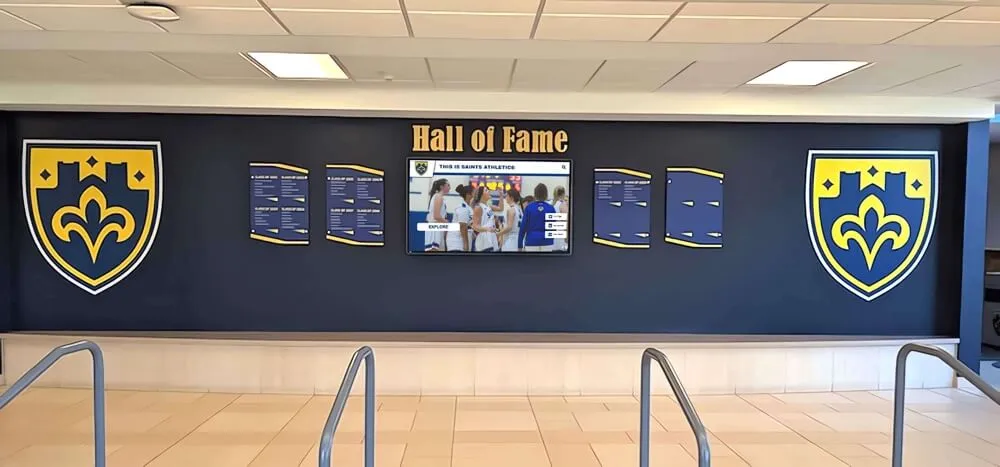
Successful implementations combine traditional recognition elements with modern digital capabilities
Create Feedback Collection Systems
Ongoing improvement requires systematic feedback gathering from multiple stakeholder groups:
- Implement annual surveys collecting student and family satisfaction data
- Conduct periodic focus groups exploring recognition program impact in depth
- Monitor analytics revealing engagement patterns and content effectiveness
- Gather coach observations about program influence on students
- Review recognition programs during forensics department evaluation cycles
- Solicit alumni feedback about historical recognition accuracy and completeness
This feedback-informed approach enables continuous enhancement ensuring recognition programs remain effective, relevant, and valued by communities they serve.
Understanding approaches used in all-state recognition programs and academic excellence celebration provides parallel frameworks transferable to forensics recognition with appropriate adaptations for competitive communication achievement.
Conclusion: Elevating Forensics Achievement Through Meaningful Recognition
Speech and debate championship recognition celebrates extraordinary achievement representing years of dedication, exceptional communication talent, competitive excellence against regional, state, and national peers, and performance mastery placing students among their generation’s finest young communicators and thinkers. These accomplishments deserve recognition matching their significance—lasting tributes that honor individual competitors while inspiring current students to pursue similar excellence through their own forensics journeys.
Traditional recognition approaches limited by bulletin board space constraints, manual update requirements, and minimal visibility fail to provide acknowledgment these achievements deserve. Modern digital recognition solutions overcome these limitations through unlimited capacity honoring every championship qualifier throughout program history, rich multimedia content bringing achievements to life beyond simple names and dates, interactive exploration enabling active engagement with competitive accomplishments, strategic placement ensuring school-wide visibility, and immediate updates maintaining current recognition.
Transform Your Forensics Recognition Program
Discover how modern digital recognition solutions can help you celebrate speech and debate champions and every competitive achievement while building thriving forensics program culture that inspires excellence.
Explore Recognition SolutionsWhether implementing new recognition programs, enhancing existing approaches, or modernizing outdated displays, digital recognition platforms provide capabilities transforming how schools celebrate competitive communication excellence. Solutions like Rocket Alumni Solutions offer purpose-built systems specifically designed for educational institutions, combining intuitive software, reliable hardware, professional implementation, and ongoing support ensuring forensics recognition programs succeed from launch through years of sustained operation.
Every championship qualifier in your program history represents remarkable achievement worthy of lasting recognition that inspires for generations. By investing in comprehensive forensics recognition, schools demonstrate genuine commitment to celebrating communication and critical thinking excellence while building positive cultures where competitive speaking and debate receive celebration equal to excellence in athletics and traditional academics.
Your school’s speech and debate champions deserve recognition honoring their extraordinary accomplishments while inspiring current students that competitive forensics excellence represents achievable goal through sustained dedication and exceptional effort. Modern recognition technology makes comprehensive, engaging, meaningful championship celebration not just possible but practical and sustainable for schools committed to honoring their finest communicators and thinkers appropriately.
Ready to begin? Explore approaches used in all-state musician recognition and student achievement celebration programs that can incorporate forensics achievements alongside comprehensive recognition of student excellence across all competitive domains.




































